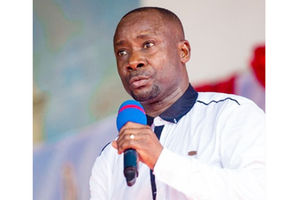Millen Magese: My voice has been heard

The march for health: Millen Magese leads other women at the Endometriosis campaign in Johannesburg, South Africa.
PHOTO| COURTESY
What you need to know:
- 2005: The year when she was first diagnosed with the condition after she moved to South Africa to pursue her modelling career. This was after a long period of suffering.
- It is believed that almost 176 million women worldwide suffer from this condition but the number could be slightly higher
She is probably one of the most successful models that Tanzania has produced in as many years, with a career that has taken her across the world.
The former beauty queen commands attention on the runways in Johannesburg, Milan, London, New York, even New Delhi to name but a few.
Millen Magese has worked with almost all the leading designers on the world and this week for the first time in her glittering career she is set to shoot in Tanzania for the first time.
“I have a photo shoot schedule with a US magazine in Zanzibar. I am really excited to be shooting in Tanzania for the first time. I had always longed for this opportunity,” she says.
The photo shoot session couldn’t have come at a better time than now when the super model is set to be recognised for her worldwide efforts to combat endometriosis and other health related issues.
In May when the Black Entertainment Television announced its nominees for annual award, Millen Magese emerged as the sole nominee for the ‘Global Good Award’, which is a new category at BET.
The BET awards ceremony will take place at the end of this month in Los Angeles California where she will receive the award.
Speaking to The Beat from Johannesburg, Millen said it was an honour for her to be the first sole nominee in the new category.
“I am so humbled. My voice and that of the African woman has been heard across the globe and it is my hope that it is going to inspire more women not only at home in Tanzania but across the world to help one another,” she says.
According to Millen, though she is the one faced with such adversity in a society that still stigmatises women without children; she believes that there are more women out there that are suffering silently.
“This is only the beginning and the goal is that we need to get affordable treatment for endometriosis. Everything involved in the treatment is very costly from everyday pain to the astronomical costs for the tests and surgeries,” says Millen.
It is believed that almost 176 million women worldwide suffer from this condition but the numbers could be slightly higher given the fact that in Africa most women dared not to speak about it.
Millen moved to South Africa in 2004 and a year later in 2005 she was officially diagnosed with endometriosis, something she had been experience since she was about 13.
Even with the diagnosis she was apprehensive at first about speaking out about her condition because she just didn’t know how the public would react.
“It has been 10 years since my diagnosis, and it has taken a total of 12 surgeries, multiple attempts to reopen my blocked fallopian tubes, a non-functional ovary and many other attempts for me to speak out,” she says
Most of the time she had to work in pain something she says has affected her in many other ways apart from the emotional breakdowns.
But the fear of being labeled didn’t stop her from going public; instead it was an encouragement to let the world know of her situation.
“At some point I really didn’t care how negatively people will take it. Instead, I posted my story on social media in the hope that one woman will be touched and be able relate to my challenge. It turns out that a lot of women have related to my situation.”
Misdiagnosis of endometriosis is still prevalent due to a lack of understanding of the disease, though some strides have been made in recent years.
She adds that the disease has a devastating effect on every area of a woman’s life, including her career and personal relationships.
Magese says that one of her goals is eventually to introduce Endometriosis Africa Awareness across the continent to empower women to take control of their health.
Last year she started “Endo Power for Africa” based Tanzania, with the aim of giving women hope and a voice to express their pain as they deal with endometriosis and infertility.
“We are doing well as more women are now opening up about their health challenges – and by telling their stories, they are getting stronger. I believe that no matter what we are going through, including health challenges as women, we must not let that stop us. We must stand and fight,” says the 5 feet 11 inch model.
She believes the campaign has gained international recognition and her aim is to push the movement to grow bigger. “We are being acknowledged and that is a good start. It is my belief that what was once treated as a shameful revelation will soon become an open affair,” she says.
As she embarks on her journey to educate more women on the mysteries that surround the condition she is aware that it is not going to be an easy task.
But even then, the recognition that she is about to receive is a refreshing feeling that finally someone somewhere has noticed her efforts and that there can be a way out of this.
What began as a self relieving post on social media has finally turned into a movement that is set to alleviate sufferings of millions of women across Africa.
What is endometriosis?
Endometriosis affects one in 10 women around the world, and it is estimated that 176 million women live with the disease globally, with 8.5 million in North America alone.
The condition is commonly diagnosed in women between 24 and 34 years old, with 27 being the most common age of diagnosis. It affects between five and 10 per cent of women of child-bearing age, an age in which women are considered to be in the prime of their lives.
Endometriosis is said to be most prevalent among certain groups of women, including 25 to 40 per cent of women affected by infertility, 40 to 60 per cent of women with dysmenorrhoea (painful periods).




